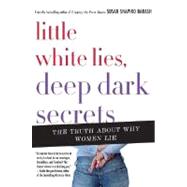
| Introduction: Enduring Tales: Enabling Choices | p. 1 |
| The Myth of the Truth | p. 15 |
| Spinning Yarns: Our Mothers' Lessons | p. 17 |
| Sex, Love, and Buried Secrets | p. 49 |
| Cashing In: Money and Lies | p. 73 |
| Through Glass Darkly | p. 95 |
| Mothering as Myth: Ambivalence and Lies | p. 97 |
| Family Matters: Shattering Secrets | p. 117 |
| Facing Our Lies: Addictions | p. 144 |
| Living the Lie | p. 183 |
| Lying to Win: Competitive Lies | p. 185 |
| Born Again: Lying to Ourselves | p. 214 |
| Bold Secrets: Lies That Make or Break Us | p. 234 |
| Conclusion: The Female Talent for the Moral Lie | p. 251 |
| Acknowledgments | p. 263 |
| References | p. 265 |
| Index | p. 277 |
| Table of Contents provided by Ingram. All Rights Reserved. |
The New copy of this book will include any supplemental materials advertised. Please check the title of the book to determine if it should include any access cards, study guides, lab manuals, CDs, etc.
The Used, Rental and eBook copies of this book are not guaranteed to include any supplemental materials. Typically, only the book itself is included. This is true even if the title states it includes any access cards, study guides, lab manuals, CDs, etc.